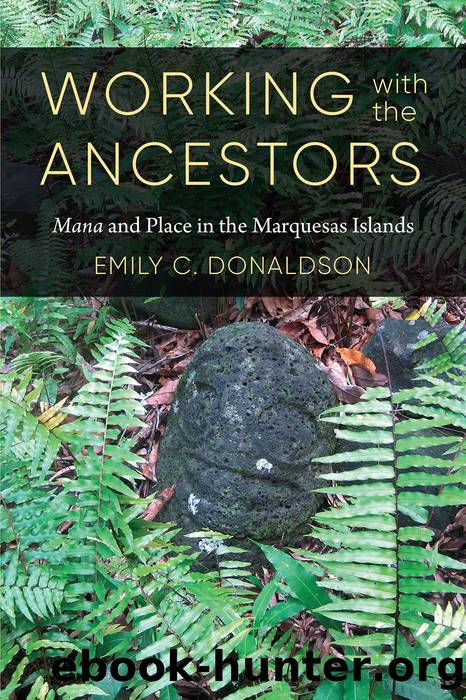Working with the Ancestors by unknow

Author:unknow
Language: eng
Format: epub
ISBN: 5785717
Publisher: University of Washington Press
Published: 2019-08-15T00:00:00+00:00
âHERITAGEâ IN TRANSLATION
In the cluttered, stuffy office of Fatu Hivaâs administrative chief, I perch on the edge of a metal seat, listening closely as Roberto Maraetaataâs soft but confident voice cuts through the sound of a nearby desk fan. Having spent the afternoon trying to get one of his two computers to work, heâs agreed to speak with me in these final hours of a long, warm workday. After chatting briefly, I ask him what the word heritage means to him. Following a short pause he replies: âHeritage is everything attached to a people, [or] a cultureâitâs a culture. Heritage is the identity of a people. Itâs a knowledge, a wealth. It is also a value that can be transmitted from generation to generation, because âheritageâ cannot have a meaning unless we can perpetuate it, [and] pass it on to subsequent generationsâ (August 29, 2013).
When I first began my fieldwork in the islands, I hoped to explore indigenous perspectives on what I knew as heritage and historic resources, as defined by UNESCO. These terminologies worked fairly smoothly during my research in Papeete, whose metropolitan character and bureaucracy link it firmly to international perspectives. Popular awareness of world heritage, in particular, was on the rise in the capital due to what were then concurrent World Heritage List nominations for TaputapuÄtea and the Marquesas. Discussion of the topic elsewhere in French Polynesia was much more limited, however, and when I reached the Marquesas, I realized I would need to change my language. Terms like heritage and historic resource are unfamiliar to many Marquesans (see appendix D, table 4), who have their own common understandings of ancestral objects, places, knowledge, and skills. This means that despite the commonalities across their translation, the actual interpretation of UNESCOâs terms is itself an illustration of power. In the context of global conservation initiatives, similar processes of translation have damaged local values as well as resources (see West 2005). Discussions of âheritageâ in the Marquesas suggest that historic preservation initiatives carry the same risk.
The word heritage, or patrimoine,9 is new to most Marquesans and has largely been introduced in association with the UNESCO project. The question, âWhat does heritage mean to you?â10 therefore helped to reveal not only local knowledge of the term but familiarity with UNESCO.11 Of the 243 people I asked, more than 40 percent said they didnât know, or were only vaguely familiar with, the term heritage (see appendix D, table 4). When asked to define it myself, I suggested that âheritage is what the ancestors left for the people of today, including paepae and ancient artifacts but also things like language, birds, trees, and fish.â12 I settled on this definition as an interpretation of UNESCOâs meaning that would also be highly âlegibleâ to Marquesans.
One discussion in the tiny village of Hohoi illustrates how this introduction of authorized terms can destabilize local confidence and establish or reinforce hierarchies of power. Ingrid Hikutini (age 24) is Palimmaâs local representative for Ua Pou and helped to translate Marquesan for my interview with her grandfather, Jean-Marie (age 73).
Download
This site does not store any files on its server. We only index and link to content provided by other sites. Please contact the content providers to delete copyright contents if any and email us, we'll remove relevant links or contents immediately.
| Paganism | Wicca |
| Witchcraft |
Becoming Supernatural by Dr. Joe Dispenza(7120)
Tools of Titans by Timothy Ferriss(6965)
The Witchcraft of Salem Village by Shirley Jackson(6587)
Inner Engineering: A Yogi's Guide to Joy by Sadhguru(5910)
The Four Agreements by Don Miguel Ruiz(5533)
The Power of Now: A Guide to Spiritual Enlightenment by Eckhart Tolle(4771)
The Wisdom of Sundays by Oprah Winfrey(4632)
Room 212 by Kate Stewart(4116)
Fear by Osho(4096)
Pale Blue Dot by Carl Sagan(4017)
The David Icke Guide to the Global Conspiracy (and how to end it) by David Icke(3892)
Rising Strong by Brene Brown(3787)
Animal Frequency by Melissa Alvarez(3762)
How to Change Your Mind by Michael Pollan(3689)
Sigil Witchery by Laura Tempest Zakroff(3657)
Real Magic by Dean Radin PhD(3574)
Secrets of Antigravity Propulsion: Tesla, UFOs, and Classified Aerospace Technology by Ph.D. Paul A. Laviolette(3567)
The Art of Happiness by The Dalai Lama(3391)
Man and His Symbols by Carl Gustav Jung(3326)
